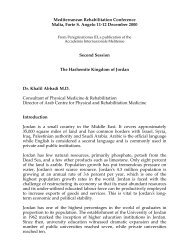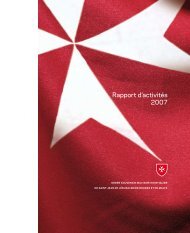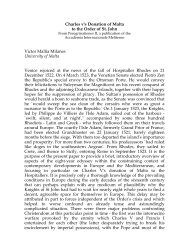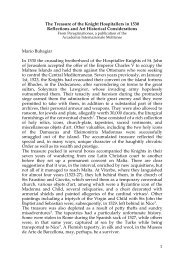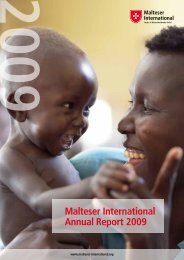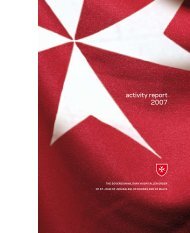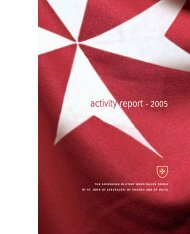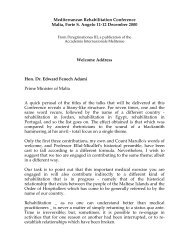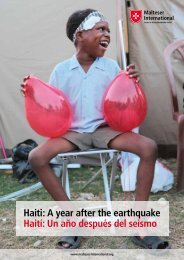Annual report 2005 Malteser International - Ordine di Malta
Annual report 2005 Malteser International - Ordine di Malta
Annual report 2005 Malteser International - Ordine di Malta
You also want an ePaper? Increase the reach of your titles
YUMPU automatically turns print PDFs into web optimized ePapers that Google loves.
supports the local health care systems in<br />
the provinces of South Kivu and Ituri in<br />
the east of the country. The basis for this<br />
is our cooperation with the health care<br />
facilities in the provinces and with local<br />
non-governmental organisations. We<br />
regularly provide more than 300 health<br />
care centres and other me<strong>di</strong>cal facilities<br />
with me<strong>di</strong>cine and me<strong>di</strong>cal equipment,<br />
so that they can carry out their services<br />
uninterrupted. In this way, over 900,000<br />
people in Kivu and around 1.8 million<br />
people in Ituri get access to improved<br />
primary health care. We believe a<br />
crucial factor is the training of local staff,<br />
conducted by our experts and provi<strong>di</strong>ng<br />
me<strong>di</strong>cal advice. In ad<strong>di</strong>tion, we collect<br />
comprehensive data to track health care<br />
development in the region and assess the<br />
effect of local measures.<br />
In 2003, we extended our programmes<br />
in both regions to provide more<br />
comprehensive help in terms of psychosocial<br />
and me<strong>di</strong>cal care for the numerous<br />
victims of sexual abuse. Since then,<br />
28 centres linked with primary health<br />
care facilities have opened up in South<br />
Kivu for sexual abuse victims, offering<br />
specialist me<strong>di</strong>cal treatment and psychosocial<br />
care. A crucial role here is played<br />
by expert training and further education,<br />
Birgit Betzelt<br />
focussing on combating trauma, as well<br />
as the monitoring of local staff and<br />
workers from local aid organisations.<br />
Thanks to sensitisation and awareness<br />
campaigns amongst the population and<br />
of the military in cooperation with local<br />
authorities, we are able to confront sexual<br />
abuse on a wide basis. Over the last year,<br />
more than 10,000 abused and raped girls<br />
and women have sought me<strong>di</strong>cal and<br />
psycho-social treatment at the health care<br />
centres supported by us. We estimate that<br />
a further 10,000 girls and women will<br />
seek professional help this year, too.<br />
A further focus of our work in South<br />
Kivu is our programme for food security,<br />
which aims to make the population<br />
more independent of external aid on a<br />
P R I M A R Y H E A LT H C A R E :<br />
Every human being should have access to<br />
fundamental me<strong>di</strong>cal care – a fact that is<br />
taken for granted, but which is not yet a<br />
reality in many countries. In ad<strong>di</strong>tion to<br />
the prevention and treatment of infectious<br />
<strong>di</strong>seases, the most crucial elements of<br />
primary health care are immunisation<br />
programmes and safe access to drinking<br />
water, food and me<strong>di</strong>cine. Others include<br />
care for pregnant women, children and<br />
the chronically sick, as well as training for<br />
me<strong>di</strong>cal staff and health education. With<br />
as little as EUR 35, we can ensure primary<br />
health care for a child or an adult person in<br />
Africa or Asia for a whole year.<br />
DR Congo: Work<br />
with women forms<br />
a focal point of<br />
our projects in<br />
South Kivu.<br />
long-term basis. To this end, we have<br />
set up 13 nutrition centres in which<br />
undernourished children under the age<br />
of five can be nursed back to health, as<br />
well as ten centres for small livestock<br />
bree<strong>di</strong>ng. Via 23 centres for food security,<br />
we <strong>di</strong>stribute seeds to the population,<br />
making a sustainable contribution to selfsufficiency<br />
in these areas. At the nutrition<br />
centres, we train staff who then establish<br />
demonstration gardens to show the<br />
population suitable cultivation methods<br />
and provide nutritional advice.<br />
DR Congo: Support for over 300 health care centres with me<strong>di</strong>cine and me<strong>di</strong>cal equipment.<br />
10<br />
A F R I C A



